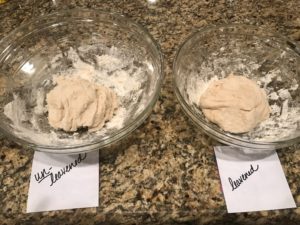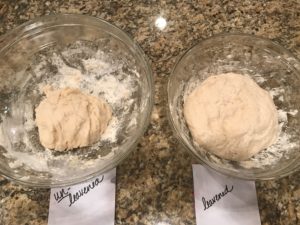We were talking about saints at the family dinner table last weekend. We were talking in terms of the Catholic church, and to be honest, I have no idea how that works.
But I’ve been thinking about it since then. Because we’re all so bent toward earning what we somehow know is out of reach. We want to be saints, but we keep looking at the sin on our hands and wondering what in the world we are to do with it.
We can deny it. We can hide it. We can say it isn’t sin at all. We can compare it (and sometimes come out on top). We can squelch all the joy out of life trying to quit.
But all these attempts fall far short of the freedom God has secured. Our Passover Lamb died to deliver us from sin, and we keep thinking we can somehow save ourselves. So God, who knows our hearts far better than we do, ordained the feast of Unleavened Bread to follow the Passover.
On the night of Passover, the Israelites were delivered from their slavery to the Egyptians. The next day, as they left the land of their captivity, they carried with them unleavened bread because they had not had time to let it rise (Exodus 12:39). Their deliverance may have been long in coming, but it was swift once it arrived.
Read Exodus 12:14-20 and Leviticus 23:6-8.
For seven days after the Passover, the Hebrew people were to eat the unleavened bread in remembrance of what God had done for them when He brought them out of Egypt.
It may have been a fast, but it was still a feast!
The first and seventh days of the feast were to be Sabbaths (Leviticus 23:7-8), days of rest to commemorate that it was the Lord who had delivered—and not their own hand.
They were to tell their children and remind themselves: “It is because of what the Lord did for me when I came out of Egypt” (Exodus 13:8). With every crunch of the unrisen bread, they looked to their Deliverer and remembered their deliverance.
He had done for them what they had been powerless to do for themselves.
In the New Testament, leaven represents sin. Unleavened bread, then, is symbolic of a sinless life.
We are unable to overcome sin on our own, and no amount of striving could close the gap. The juice of the fruit covered Eve’s hands (Genesis 3), and we’ve been wiping sticky palms in the dust ever since. Powerless to make it better. Only dirtying what we try to clean.
Read 1 Corinthians 5:6-8:
“Do you not know that a little leaven leavens the whole lump? Cleanse out the old leaven that you may be a new lump, as you really are unleavened. For Christ, our Passover lamb, has been sacrificed. Let us therefore celebrate the festival, not with the old leaven, the leaven of malice and evil, but with the unleavened bread of sincerity and truth.”
A little leaven leavens the whole lump.
I did an experiment last night. I made one lump of leavened dough and one lump of unleavened.



A little leaven really does leaven the whole lump. There’s nothing I could have done at that point to remove the leaven from the dough. It would require a new batch. A new loaf. A little sin will stain the whole sinner. We require a new life. And we have a Lord who delivers it!
Christ our Passover has been sacrificed.
The first Passover lambs brought freedom from the bondage of slavery to the Egyptians. Our Passover Lamb delivers us from the bonds of sin and death.
The One who knew no sin took on our sin to make us righteous to stand before God (2 Corinthians 5:21). The sinless One died a sinner’s death and was laid in the grave as the Passover sun set, giving way to the first day of the feast of Unleavened Bread (John 19:38-42).
With every crunch of the unrisen bread, we remember the sinless Savior.
Our Passover Lamb is our Unleavened Bread.
So how do we sinners become the saints?
We reach our sin-stained hands up to heaven, and the hand of the Sinless One reaches down with a bit of Unleavened Bread between His fingers: “This is my body, which is given for you. Do this in remembrance of me” (Luke 22:19).
And with a crunchy bite of the unrisen bread the sinner becomes a saint.
And every time we eat it, we remember: “It is because of what the Lord did for me” (Exodus 13:8).
“While we were still sinners, Christ died for us” (Romans 5:8). And so we stand beside a sinless Savior laid in a borrowed tomb. Is there life after this death? Yes. Firstfruits is coming.
Our Unleavened Bread will indeed rise!
If you’re following along with the study by filling in the chart about the feasts, here are your three points for the feast of Unleavened Bread: